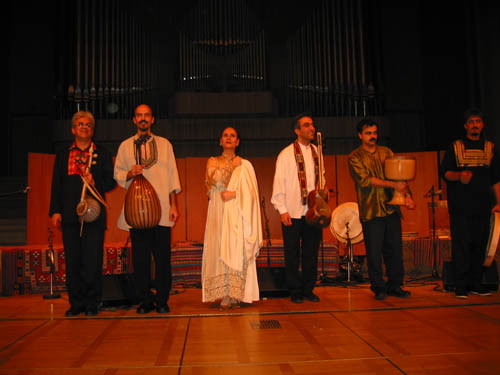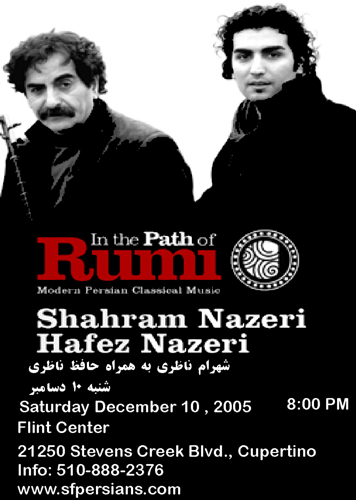Thousand of years ago when the earth was still flat and the world was a simple story with a beginning, a middle and an end and very finite, Iran was the center of the world and surrounded either with mysterious mountains or rivers and few enemy across the borders. There was a king whose name was Keikavoos. He had a very handsome son name Siavash. He had promised his son that he would give up his empire and leave him to rule as he wished. The day arrived when his son came of age and claimed the thrown. Alas, his father was not ready to abdicate yet and he put off fulfilling his promise by requiring him to fulfill a task before he could assume the throne, and when the task was fulfilled he added another and so on an so forth.
Not only did that promise remain unfulfilled, but through further deceit and lies, he first banished the innocent boy and then caused him to die a horrible death. The legend says that where Siavash’s head got off, somewhere in the border of his homeland, a plant called Siavash’s Feather grows that up to this day Iranian use for medicinal purposes.
Iranians still mourn this loss, and the procession is called Soug-e Siavash, indicating the intensity of their grief. Many of us are still wondering why Siavash wanted to rule and why his father refused to give up his kingdom. What was he so afraid of? After all, he had done his job and it was his son’s turn. What was so difficult that it was worth a father to lose such son?
Many years have passed since then. We now know that the earth is not flat and that the world is not so simple. In fact, it is indeed very confusing and muddled. With the advent of the computer and the internet and all communication devices it seems that the infinity of the universe is extended to our world as well. And with this infinity comes uncertainty and a sense of being lost. Iran is not the center of this vast world anymore and to tell you the truth, I even doubt if we ever existed—after all, it only takes one person from Yale or Harvard to assert or deny our existence and that is all.
The theme of the rivalry between father and son is not so unique to the Siavash, but it emerges in various form, again and again, through our Epic. this repetition, indicating the battle of old and new, is well rooted in our culture like many other old cultures. That the old and decadent have not given themselves willingly to the young and new, that the old has always resisted and, an more so, eliminated the new, is a repeated story, thought, no one ever learned from it. No one learned that there is always a younger generation who wants a new world order, and there is always an old one who desperately hung to the old and rotten order.
Today our story is just a little worse. The young is fighting with ones who want to go back even to way before their own order. In 1997, when the new generation and a new gender (women) voted against the old world order in a landslide, the old not only resisted, but forcefully eliminated them. In 2002 when students in the universities demanded their rights, they were thrown out of the widows or slashed with knives. The deputies in the parliament who wanted reform and justice were forced to resign.
In the 2005 elections, the elimination took different forms. In Khordad 22, 2005, women who demonstration for equal rights were beaten by police. In Khordad 22, 2006, the same group of women was brutally harassed and beaten by police right in front of a thousand cameras.
Today, as in old times, any demand or movement for a world new order is confronted harshly by resistance and the violence of the old world order. Of course the only difference is its scale and and its method.
As Siavash were assaulted, so were Mazdak and Mani, Nezam ol-Molk and Amir Kabir and Kasravi, the Bab, Dr. Mosaddeq and Rouzbeh, Bakhtiar and Ghasemlou and Sarkouhi and Ganji and thousands of others such as those lying is mass graves, like the journals Salam and Shargh.
The old castles were simple to protect and so were the old towns and lands. Today, the infinity of life makes it difficult due to the existence of many other institutions. However, there are always other alternatives, tortures, jails, solitary confinements, loss of jobs and other privileges and above all breaking pens and leaving people in absolute darkness.
Siavash and his desire for a new world order is fully alive insofar as he is not alone anymore; we have thousands of them now and the old king needs an army of millions to kill them. I saw some of them last mount in Symphony Space in New York City. When Parissa appeared on stage with her ensemble, Dastan, I expected to listen to well-composed traditional classical Iranian music with all the dastgahs and goushehs in order, but when she started, I saw a tornado, a hurricane. I do not know what happened to that calm, reserved lady who appeared a few years ago on the same stage. She broke away from that old Parissa we knew.  She went much further with a very strong voice, with confidence, with passion, and with real determination just to make sure everyone would hear her. She was not too shy to step out of the limits set for her by the previous masters or the traditions. She tore the hejab which was put around her by old rules; she even broke free from her womanhood, although she was free to be a woman. She was an authority unto herself to do what she wanted to do. She sang, and with her voice brought a sense of freedom to all of us. While she was singing I could hear a chorus of women singing with her. I could hear In Soroud-e Zendegi from every corner of the symphony hall. I heard Mansourehs, Noushins, Parvins, Shadis, Royas and Shahlas and others in every voice rising from the stage.
She went much further with a very strong voice, with confidence, with passion, and with real determination just to make sure everyone would hear her. She was not too shy to step out of the limits set for her by the previous masters or the traditions. She tore the hejab which was put around her by old rules; she even broke free from her womanhood, although she was free to be a woman. She was an authority unto herself to do what she wanted to do. She sang, and with her voice brought a sense of freedom to all of us. While she was singing I could hear a chorus of women singing with her. I could hear In Soroud-e Zendegi from every corner of the symphony hall. I heard Mansourehs, Noushins, Parvins, Shadis, Royas and Shahlas and others in every voice rising from the stage.
That night when we left, it was already late at night but none of us wanted to go home. We walked downtown from the Upper West Side. Along the way, my friend pointed at some large plums in the all-night grocery store and said “for years I wanted to grab one of these plums and eat it but I can’t.” While I was expecting some dietary explanation, she continued with an anecdote regarding a plum tree in her backyard which was raided by her brother against the arbitrary forbidding order of her father. She said that the scene which occurred when her father saw her brother bringing a bowl full of the plums into the room left her with such horror that she could never touch any plums. I do not know that I wanted to share her pain or if it was my own hidden pain which needed some company that I told her that a soccer game has the same effect on me when I remember how years and years ago, my brother was beaten by my father simply for playing soccer in a clay court in our neighborhood. He was beaten quite regularly, first for the crime of playing soccer with some 21 other boys whom my father could not run a background check on, and secondly for the crime of getting dusty after playing. I think it was the second crime which my brother could never defend or do anything about; there was no grass court in Tehran then.
Needless to say, it was not the first time that the two of us saw plums together or talked about my brother, but it certainly was the first time that both of us talked about the tyranny we both lived under, a petty tyranny within a system, within the government of a family, an institution which both of us cherish, the tyranny of a person that both of us respect and love and undeniably were both so in debt to. It was not these about which we complain, it was the tyranny, it was that unrestricted power, and it was the arbitrariness of their rules, that outdated mindless orders that we should follow without question. Later on, I was thinking what if one of us would have asked my father how one could avoid dust when playing in a clay court? Or how we should play soccer if there are not the right number of people playing? I was also thinking how my father would have responded to those questions. Could it be the reason that he would never let us to question was simply that he had no answer?
Last night I saw the Siavash Feather plant growing again, this time in the Asian Society. 
Shahram Nazeri and his son Hafez performed their “In the Path of Rumi.” I know Nazeri’s work and his effort to raise the voice of Iranian music for the last thirty years. But last night’s performance was not in line with what he had done for Iranian music before. He seemed to have fulfilled the promise that was given to Siavash after so much delay. Nazeri did something that was more like magic. He submitted to the new order of music set by his talented son, Hafez, without any hesitation and without any force. I could not imagine in my wildest dreams that any master of Iranian classical music could sing along with a western ensemble. And the strange thing was that he was so comfortable, it was as if it was the most natural thing for him to singing along with a cello playing beside him. And believe it or not, nothing catastrophic occurred. The earth did not become flat again and the day after sun rose as usual from the east. The only difference was that some of the audience who were not familiar with our traditional music listened to it with ease and enjoyed it.
Another thing about this concert: it was an acknowledgment by an old Master that it was time to leave the stage to a new one and even help him to play his turn. Nazeri did this task gracefully as would be expected from a Master such as himself. It was the beginning of a new era. Here’s hoping that our old politicians in Iran would hear this music. I am sure it would be very hard for many of them to accept that either. Last night I felt like I had sipped a Siavash’s Feather concoction, only just thicker, stronger, and more effective, yet soothing, just like Balm in Gilead.
To read the rest, click here.